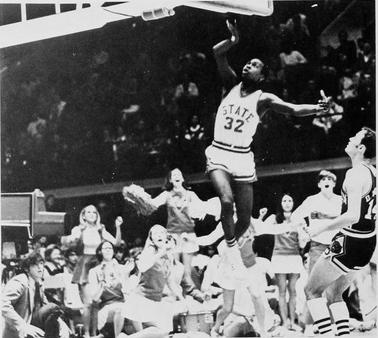
Courtesy of Agromeck
N.C. State player Al Heartley elevates to score a slam dunk in Reynolds Coliseum.
Reynolds Coliseum is no stranger to hosting moments that helped shape what we recognize today as ACC basketball. Affectionately called the Old Barn, Reynolds witnessed a triumphant moment in ACC history when Billy Jones of Maryland became the first African-American to play in the ACC men’s basketball tournament in 1966.
North Carolina and Duke were the next ACC programs to follow Maryland and walk across the color line. UNC men’s basketball star Charles Scott, the first African-American scholarship athlete for the Heels, became the most memorable of these athletes.
‘Great Scott’ went on to become an All-American for the Tar Heels. He won numerous awards throughout his career, including a gold medal at the 1968 Olympics and an NBA Championship with the Boston Celtics in 1976. Scott was also a three-time NBA All-Star from 1973-1975.
Before former head coach Norm Sloan stepped into the men’s basketball head coaching position for N.C. State, former head coach and athletics director Everett Case had considered recruiting Walt Bellamy. Bellamy would’ve become the first African-American in the men’s basketball program, but instead he chose to attend Indiana.
Bellamy went on to win a gold medal at the 1960 Olympic Games and was named a second team All-American in 1961. He was selected No. 1 overall pick in the 1961 NBA Draft and was a four-time NBA All-Star. Bellamy was inducted into the Naismith Hall of Fame in 1993.
At the beginning of the 1967 season, Al Heartley of Clayton, NC joined the N.C. State men’s basketball program and became the program’s first African-American men’s basketball player.
Heartley, who walked onto the freshman team during his first year, averaged eight points per game in his year on the team. His stellar play earned him a spot on the varsity team the next season.
Heartley was not the first African-American athlete at N.C. State. In 1956, Walter Holmes Jr. and Manuel Crockett became members of the varsity track team. That same year, Irwin Holmes joined the Wolfpack tennis team. Holmes, who was ranked as high as the No. 2 African-American tennis player in the country while in high school, went on to become a co-captain for the Wolfpack in his senior year.
In 1970, Heartley helped lead the Pack to an ACC Tournament title. In that season, the Wolfpack posted a 23-7 record and advanced to the Sweet Sixteen of the NCAA Tournament.
He became the team’s captain in his senior year, subsequently becoming the first African-American captain in the program’s history. In his final season in Raleigh, Heartley averaged six points and 3.7 rebounds per contest.
In 1971, Heartley won the Alumni Athletics Trophy, given to the school’s top athlete as voted on by the student body.
All the accomplishments of the Wolfpack men’s basketball team perhaps wouldn’t have been possible without Heartley’s success on the N.C. State teams of 1967-1971. Heartley helped pave the way for other African-Americans to play basketball for Sloan at N.C. State, including Ed Leftwich and David Thompson.
Leftwich, a highly recruited player from Burlington, N.J., was the first African-American men’s basketball player to receive a scholarship at State in 1969. In his debut season, Leftwich averaged 16.4 points and four rebounds per game.
Thompson became perhaps the most celebrated athlete in Wolfpack history. He was a three-time first team All-American, three-time ACC Player of the Year, and a two-time AP player of the year during his time at N.C. State. He even led the Pack to a national championship in 1974 and an undefeated season in 1975.
Thompson was drafted No. 1 overall in the 1975 NBA Draft and was named to the Naismith Basketball Hall of Fame in 1996. His 44 jersey, which hangs in the rafters of PNC Arena, is the only retired number in N.C. State men’s basketball history.
Thompson’s accomplishments helped put N.C. State basketball on the map and helped attract more talented players to play for the Wolfpack, including African-American players.
Modern day Wolfpackers such as junior forward Calvin Leslie and junior guard Lorenzo Brown might not be playing for the Pack if Heartley hadn’t pioneered the way for all African-American basketball players at N.C. State.